

CVS to stop selling cigarettes and other tobacco by Oct. 1. Marketplace_segment07_20140117_64.mp3. Dr. Micah Berman, Ohio State University – Social Butterfly. This week we’ll be featuring five winners of The Academic Minute’s Third Annual Senior Superlatives.
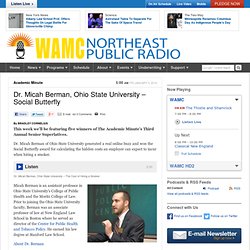
Dr. Micah Berman of Ohio State University generated a real online buzz and won the Social Butterfly award for calculating the hidden costs an employer can expect to incur when hiring a smoker. Dr. Micah Berman, Ohio State University – The Cost of Hiring a Smoker Micah Berman is an assistant professor in Ohio State University's College of Public Health and the Moritz College of Law. About Dr. Dr. By reviewing and synthesizing previous studies, my co-authors and Isought to estimate the excess annual costs that a private sector US employer could attribute to employing an individual who smokes tobacco, as compared to a non-smoking employee. Production support for the Academic Minute comes from Newman’s Own, giving all profits to charity and pursuing the common good for over 30 years, and from Mount Holyoke College.
Money Replaces Willpower In Programs Promoting Weight Loss : Shots - Health News. Hide caption Peggy Renzi (middle) talks with her teammates Erika Hersey (left) and Erica Webster.
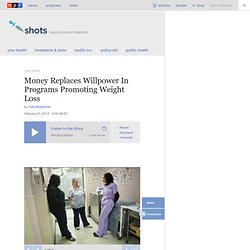
The three are part of a team of nurses in the Bowie Health Center emergency room in Bowie, Md., who are working together to lose weight. Gabriella Demczuk /NPR Hide caption Teammates (from left) Erica Webster, Peggy Renzi, Erika Hersey, Quan Harper and Nyuma Harrison entered a national weight loss contest in hopes of winning $10,000. Gabriella Demczuk /NPR Hide caption Nyuma Harrison uses her phone and social networking websites to track progress and motivate the team. Gabriella Demczuk /NPR Hide caption Nurse Peggy Renzi makes the effort to bring a healthy lunch to work every day instead of buying snacks from the vending machines or grabbing fast food. Gabriella Demczuk /NPR Hide caption Erika Hersey is more careful now about the types of groceries she buys, opting for healthier selections.
Hide caption Nyuma Harrison photographs the groceries she purchased. Do penalties for smokers and the obese make sense? Originally published January 26, 2013 at 3:28 PM | Page modified January 26, 2013 at 5:54 PM NEW YORK — Faced with the high cost of caring for smokers and overeaters, experts say society must deal with a blunt question: Instead of trying to penalize them and change their ways, why not just let these health sinners die prematurely?
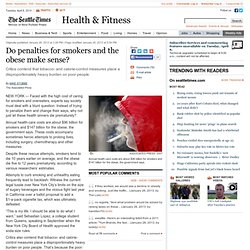
Annual health-care costs are about $96 billion for smokers and $147 billion for the obese, the government says. These costs accompany sometimes heroic attempts to prolong lives, including surgery, chemotherapy and other measures. Despite these rescue attempts, smokers tend to die 10 years earlier on average, and the obese die five to 12 years prematurely, according to various researchers’ estimates. “This is my life. Critics also contend that tobacco- and calorie-control measures place a disproportionately heavy burden on poor people. . • Smoke more than the rich and have higher obesity rates. • Have less money so sales taxes hit them harder. Public-health problems. Coverage for Tobacco Use Cessation Treatments - Role of Health Insurance - Smoking & Tobacco Use. Health insurance coverage of medication and counseling increases the use of effective treatments.18Although 66% of Americans under the age of 65 are insured through an employer,22only 24% of employers offer any coverage for tobacco-use treatment.23 Coverage of tobacco-use cessation treatment increases both use of effective treatment and the number of successful quit attempts.18 How Much Do Cessation Benefits Cost?
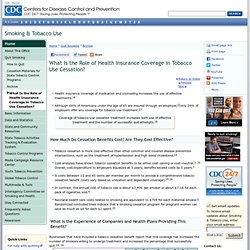
Are They Cost Effective? What Is the Experience of Companies and Health Plans Providing This Benefit? Businesses that have included a tobacco cessation benefit report that this coverage has increased the number of smokers willing to undergo treatment and increased the percentage that successfully quit.24, 26. Hall Health Primary Care Clinic. Tobacco Talk is an expanded program to help UW students, UW employees, and patients of Hall Health Center stop using tobacco products.
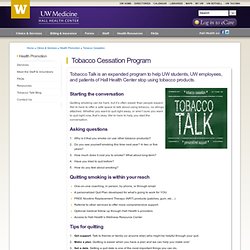
Starting the conversation Quitting smoking can be hard, but it’s often easier than people expect. We’re here to offer a safe space to talk about using tobacco, no strings attached. Whether you want to quit right away, or aren’t sure you want to quit right now, that’s okay. We’re here to help you start the conversation. Asking questions. How Much Money Are You Spending on Cigarettes? - How to Quit Smoking. U.S. surgeon general joins effort to reduce smoking in youths. Despite efforts to reduce smoking in Washington state, 70,000 youths smoke cigarettes and 50 start every day, according to state officials, with American Indian youth showing the highest rates.
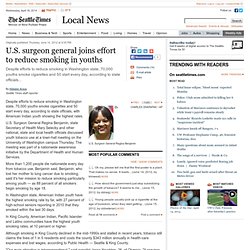
U.S. Surgeon General Regina Benjamin, state Secretary of Health Mary Selecky and other national, state and local health officials discussed youth tobacco use at a town-hall meeting on the University of Washington campus Thursday. The meeting was part of a nationwide awareness initiative by the Department of Health and Human Services. More than 1,200 people die nationwide every day from tobacco use, Benjamin said. Benjamin, who lost her mother to lung cancer due to smoking, said it's her mission to reduce smoking particularly among youth — as 88 percent of all smokers begin smoking by age 18.
In Washington state, American Indian youth have the highest smoking rate by far, with 27 percent of high-school seniors reporting in 2010 that they smoked within the last 30 days. PepsiCo workers balk at paying company's 'sin tax' Four years ago, PepsiCo began rolling out a wellness program that charges its employees $50 a month if they smoke or have obesity-related medical problems such as diabetes, hypertension and high blood pressure. Workers can avoid the surcharge if they attend classes to learn how to break their nicotine addictions or lose weight.
When about 400 unionized PepsiCo bottlers and truck drivers in central New York learned early last year they'd be subject to the fee, they rebelled. It's a "sin tax," says Ozzie Martucci, secretary-treasurer of Teamsters Local 669 in Albany. "We're against that type of tax, frankly. It feels wrong. " The workers decided they wanted to withdraw as a group from Pepsi's health plan, so Martucci began shopping for a new one.
"We have always been willing to provide the unions with as much information as possible," says Dave DeCecco, a PepsiCo spokesman. "Most rational people understand that one product is not the cause of obesity," says DeCecco. Financial incentives can help smokers quit. By Liz Szabo, USA TODAY When trying to quit smoking, it can help to keep your eyes on the prize — especially if that prize is $750.
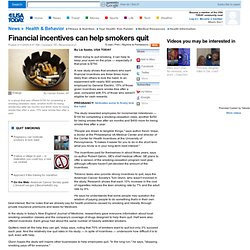
A new study shows that smokers who earn financial incentives are three times more likely than others to kick the habit. Financial Incentives Help Smokers Quit. Study Shows Money Can Motivate Smokers to Quit Smoking Why do I need to register or sign in for WebMD to save?

We will provide you with a dropdown of all your saved articles when you are registered and signed in. Feb. 11, 2009 -- No matter how much people are told about the hazards of cigarette smoking, cold hard cash may be the best motivator to get people to quit, a new study suggests.